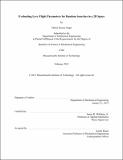Evaluating levy flight parameters for random searches in a 2D space
Author(s)
Singh, Mukul Kumar
DownloadFull printable version (353.4Kb)
Other Contributors
Massachusetts Institute of Technology. Department of Mechanical Engineering.
Advisor
James H. Williams, Jr..
Terms of use
Metadata
Show full item recordAbstract
It is experimentally known that the flight lengths of random searches by foragers such as honey bees statistically belong to a power law distribution. Optimality of such random searches has been a topic of extensive research because knowing their optimal parameters may help applied sciences. Viswanathan et al. have shown the inverse-square power law to be the optimal law for such random searches. This thesis explores the capability of the model presented in such that it can be applied to Unmanned Autonomous Vehicles (UAVs). The thesis also identifies the minimum flight length, lmin, as an important factor that needs to be controlled based on the UAV's sensor range. We present a theoretical lmin as an explicit function of the sensor range, rv, and an estimated target density, p.
Description
Thesis (S.B.)--Massachusetts Institute of Technology, Dept. of Mechanical Engineering, 2013. This electronic version was submitted by the student author. The certified thesis is available in the Institute Archives and Special Collections. Cataloged from student-submitted PDF version of thesis. Includes bibliographical references (pag 23).
Date issued
2013Department
Massachusetts Institute of Technology. Department of Mechanical EngineeringPublisher
Massachusetts Institute of Technology
Keywords
Mechanical Engineering.